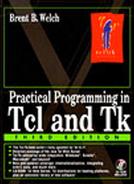- Copyright
- List of Examples
- List of Tables
- Preface
- Tcl Basics
- Tcl Fundamentals
- Getting Started
- The Guestbook CGI Application
- String Processing in Tcl
- Tcl Lists
- Control Structure Commands
- Procedures and Scope
- Tcl Arrays
- Working with Files and Programs
- Running Programs with exec
- The file Command
- Cross-Platform File Naming
- Manipulating Files and Directories
- File Attributes
- Input/Output Command Summary
- Opening Files for I/O
- Reading and Writing
- The Current Directory — cd and pwd
- Matching File Names with glob
- The exit and pid Commands
- Environment Variables
- The registry Command
- Advanced Tcl
- Tk Basics
- Tk Widgets
- Tk Details
- C Programming
- Changes
- Tcl 7.4/Tk 4.0
- wish
- Obsolete Features
- The cget Operation
- Input Focus Highlight
- Bindings
- Scrollbar Interface
- pack info
- Focus
- The send Command
- Internal Button Padding
- Radiobutton Value
- Entry Widget
- Menus
- Listboxes
- No geometry Attribute
- Text Widget
- Color Attributes
- Color Allocation and tk colormodel
- Canvas scrollincrement
- The Selection
- The bell Command
- Tcl 7.5/Tk 4.1
- Tcl 7.6/Tk 4.2
- Tcl/Tk 8.0
- The Tcl Compiler
- Namespaces
- Safe-Tcl
- New lsort
- tcl_precision Variable
- Year 2000 Convention
- Http Package
- Serial Line I/O
- Platform-Independent Fonts
- The tk scaling Command
- Application Embedding
- Native Menus and Menubars
- CDE Border Width
- Native Buttons and Scrollbars
- Images in Text Widgets
- No Errors from destroy
- grid rowconfigure
- The Patch Releases
- Tcl/Tk 8.1
- Tcl/Tk 8.2
- Tcl/Tk 8.3
- About The CD-ROM
- Tcl 7.4/Tk 4.0
- Index
Chapter 16. Event-Driven Programming
This chapter describes event-driven programming using timers and asynchronous I/O facilities. The after command causes Tcl commands to occur at a time in the future, and the fileevent command registers a command to occur in response to file input/output (I/O). Tcl commands discussed are: after, fblocked, fconfigure, fileevent, and vwait.
Event-driven programming is used in long-running programs like network servers and graphical user interfaces. This chapter introduces event-driven programming in Tcl. Tcl provides an easy model in which you register Tcl commands, and the system then calls those commands when a particular event occurs. The after command is used to execute Tcl commands at a later time, and the fileevent command is used to execute Tcl commands when the system is ready for I/O. The vwait command is used to wait for events. During the wait, Tcl automatically calls Tcl commands that are associated with different events.
The event model is also used when programming user interfaces using Tk. Originally, event processing was associated only with Tk. The event loop moved from Tk to Tcl in the Tcl 7.5/Tk 4.1 release.
-
No Comment
